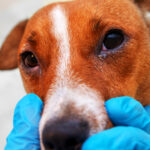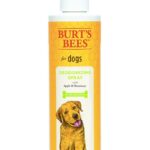Why Is My Dogs Butt Itchy
Scratching the Surface: Unraveling the Mystery of Why Is My Dog’s Butt Itchy
If you’re a dog owner, you may have noticed that your furry friend sometimes scoots or scratches their rear end against the ground, furniture, or your leg. While this behavior can be amusing or annoying, it may also signal an underlying issue that affects your pet’s comfort and health. One common cause of canine butt itchiness is allergies, but there are many other factors that could be at play. In this article, we’ll explore some possible reasons why your dog’s butt is itchy and what you can do to help them feel better.
Section 1: Introduction
Dogs may not be able to talk like humans, but they communicate through various means, including body language, vocalizations, and behavior. One way dogs express discomfort or irritation is by scratching or biting themselves, especially in areas that are hard to reach or sensitive. The anal region of a dog is one such area that can be prone to itching or inflammation due to various triggers. However, not all butt-scratching is equal, and it’s essential to understand the underlying causes before treating the symptoms. In this section, we’ll discuss why dogs scratch themselves in general and how to tell if it’s a sign of a more significant problem.
Subsection 1.1: The Science of Scratching
Scratching is a reflexive response to an external stimulus or internal sensation that triggers nerve endings in the skin. It serves several purposes, such as removing irritants or parasites from the surface of the skin, stimulating blood flow and lymphatic drainage, and releasing endorphins that reduce pain and stress. However, excessive scratching can lead to skin damage, infection, scarring, and self-trauma. That’s why it’s important to observe your dog’s scratching habits and look for signs of redness, swelling, discharge, or odor that could indicate an underlying infection or allergy.
Subsection 1.2: The Butt of the Matter
The anal region of a dog is a complex and sensitive area that performs several functions, such as eliminating waste, marking territory, and communicating with other dogs through pheromones. However, this area is also vulnerable to various health issues that can cause discomfort and itchiness. Some possible causes of canine butt itchiness include:
– Allergies: Dogs can be allergic to various environmental triggers, such as pollen, dust mites, mold spores, or food ingredients. When exposed to these allergens, their immune system may overreact and produce histamines that cause inflammation and itching. Allergies can affect different parts of the body, including the skin around the anus, which can become red, swollen, or scaly. Some dogs may also develop secondary infections due to scratching or licking.
– Parasites: Dogs can host various internal and external parasites that feed on their blood or tissues. Some common parasites that affect the anal area include fleas, ticks, lice, mites, and worms. These parasites can cause irritation, itching, redness, and even anemia or disease if left untreated. They can also spread to humans or other pets in the household.
– Infections: Dogs can contract various bacterial or fungal infections that affect the skin around the anus or inside the rectum. Some common types of infections include pyoderma (bacterial), dermatitis (fungal), proctitis (inflammation of the rectum), or perianal fistulas (chronic abscesses). These infections can cause pain, itching, discharge, or foul odor.
– Anal gland problems: Dogs have two small sacs located on either side of their anus that produce a smelly liquid used for scent marking and social signaling. However, sometimes these glands can become blocked, infected, or inflamed, leading to discomfort and itchiness. Some dogs may also develop anal gland abscesses, which require veterinary treatment.
– Anal sac tumors: Although rare, some dogs may develop malignant tumors in their anal glands or nearby tissues that can cause pain, swelling, or bleeding. These tumors can be diagnosed through a biopsy and treated with surgery, radiation therapy, or chemotherapy.
Subsection 1.3: How to Diagnose the Problem
Since there are several possible causes of canine butt itchiness, it’s crucial to get a proper diagnosis from a veterinarian before trying any home remedies or over-the-counter products. A vet can perform various tests and examinations to determine the underlying problem and recommend an appropriate treatment plan. Some common diagnostic methods include:
– Physical examination: A vet will inspect your dog’s anus and surrounding skin for signs of inflammation, infection, or parasites. They may also check your dog’s temperature and weight to rule out systemic issues.
– Skin scrapings: A vet may take a sample of your dog’s skin cells and examine them under a microscope to look for evidence of bacterial or fungal infections.
– Blood tests: A vet may order blood tests to check for allergies or systemic diseases that could contribute to your dog’s itching.
– Fecal exams: A vet may analyze a sample of your dog’s feces for the presence of internal parasites such as worms or protozoa.
– Imaging studies: A vet may use X-rays, ultrasound, or other imaging techniques to look for tumors or other abnormalities in your dog’s anal area.
Section 2: Possible Treatments
Once you know what is causing your dog’s butt itchiness, you can work with your vet to develop a comprehensive treatment plan that addresses both the symptoms and the underlying problem. Depending on the severity and nature of the issue, some possible treatments may include:
Subsection 2.1: Medical Interventions
– Medications: Depending on the cause of your dog’s itching, your vet may prescribe various medications to relieve pain, inflammation, or infection. These may include antibiotics, antifungals, corticosteroids, antihistamines, or analgesics. Some medications may have side effects or require careful monitoring.
– Surgery: If your dog has an abscess, a tumor, or a severe case of impaction in their anal glands, surgery may be necessary to remove the affected tissue and prevent complications.
– Allergy testing and immunotherapy: If your dog has allergies that trigger their itching, your vet may recommend allergy testing to identify the specific allergens and then formulate a custom immunotherapy regimen that desensitizes their immune system over time. This treatment can be costly and time-consuming but can provide long-term relief for some dogs.
Subsection 2.2: Home Remedies
– Bathing: Regular bathing with mild shampoo can help soothe inflamed skin and remove allergens or parasites from your dog’s coat. However, over-bathing can strip the natural oils from their skin and worsen dryness or irritation.
– Diet changes: If your dog has food allergies or sensitivities, switching to a hypoallergenic diet or eliminating certain ingredients can improve their overall health and reduce their itching. Your vet can recommend appropriate brands and formulations.
– Supplements: Some supplements such as omega-3 fatty acids, probiotics, or herbal remedies may have anti-inflammatory or immune-modulating effects that can benefit dogs with itchy skin. However, not all supplements are safe or effective, so consult your vet before giving any to your dog.
– Environmental management: If your dog is allergic to environmental triggers such as pollen or dust mites, you can try reducing their exposure by keeping them indoors during peak allergy seasons, using air purifiers or HEPA filters, or washing their bedding frequently.
Section 3: Prevention and Maintenance
While some causes of canine butt itchiness may be beyond your control, there are several ways you can prevent or minimize the risk of recurrence. In this section, we’ll discuss some general tips for maintaining your dog’s health and hygiene.
Subsection 3.1: Hygiene Habits
– Anal gland expression: Some dogs need regular manual expression of their anal glands to prevent impaction or infection. Your vet can show you how to do it safely and effectively or perform it for you.
– Cleanliness: Regularly cleaning your dog’s anus with baby wipes or a damp cloth can help remove fecal residue and reduce bacterial growth. However, avoid using harsh soaps or alcohol-based products that can dry out the skin.
– Grooming: Regular brushing and trimming of your dog’s fur around the anus can prevent matting, tangles, or fecal buildup that can cause irritation or infection. It can also help you detect any abnormalities early.
Subsection 3.2: Health Habits
– Vaccinations: Keeping your dog up-to-date on their vaccinations can protect them from various infectious diseases that can affect their anal area or other organs.
– Parasite prevention: Using flea and tick preventatives, dewormers, and heartworm preventatives as recommended by your vet can reduce your dog’s risk of contracting external or internal parasites that cause itching.
– Exercise and diet: Providing your dog with regular exercise and a balanced diet appropriate for their age, breed, and activity level can boost their immune system, maintain their weight, and promote overall health.
Conclusion: Don’t Butt Out When It Comes to Your Dog’s Health
In conclusion, why is my dog’s butt itchy? The answer is not always straightforward, but it’s essential to pay attention to your pet’s behavior and seek professional advice if you notice any signs of discomfort or irritation. From allergies to parasites, infections, and gland problems, there are many possible causes of canine butt itchiness that require different treatments. However, with proper diagnosis, treatment, and prevention strategies, you can help your dog feel more comfortable and happy. Remember to consult your vet before trying any home remedies or over-the-counter products and follow their advice closely. After all, a healthy dog is a happy dog!



